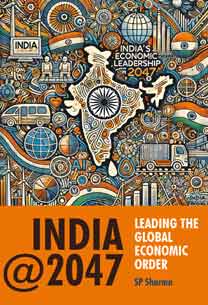India’s journey towards Viksit Bharat (Developed India) is marked by resilience, adaptability, and a steadfast commitment to progress. As the nation moves towards 2047, the centenary of its independence, its vision is to emerge as a global economic superpower.
The book, India@2047: Leading the Global Economic Order, provides an in-depth exploration of India’s economic trajectory, offering insights into its growth, development strategies, and policy measures that will shape its future.
It meticulously examines India’s economic landscape, showcasing its remarkable achievements, identifying challenges, and outlining crucial reforms needed to advance sustainable and inclusive growth. The book delves into key sectors, including agriculture, industry, technology, exports, infrastructure, health, and education, highlighting their role in fostering economic and social transformation. Furthermore, it underscores India’s potential to lead in a rapidly evolving global economy through innovation, digitalisation, and strategic policymaking.
By addressing critical areas for development and identifying pathways for progress, this book serves as a guiding framework for India’s ambitious goal of becoming a developed nation—‘Viksit Bharat’—by 2047.
From the Foreword
The Indian economy is much more diversified today. The MSME sector is being promoted, as is domestic manufacturing through Aatmanirbhar Bharat. Infrastructure has been developed at a much faster pace. The service industries, software, IT services, and electronics are growing rapidly. Particular emphasis is being placed on the empowerment of women. Subsidised clean fuel, monthly income transfers, and direct benefit transfers through bank accounts all contribute. Renewable power generation is being promoted, and today the renewable energy (RE) capacity—including solar, wind, and both small and large hydro—is 44% of the total installed capacity. Global alliances have been set up in solar energy and biofuels, and India is forging multilateral and bilateral alliances.
This book describes all these various measures, the context in which they have been introduced, and their importance.
— Kirit Parikh
Chairman, Integrated Research and Action for Development, IRADe.
Dr. S P Sharma is a distinguished economist with a strong presence in both national and international economic arenas. He holds an MPhil in Economics (Industrial Economics) and a PhD in Management (International Business) from the prestigious Panjab University, Chandigarh. With over 27 years of experience in economic research and policy advocacy, he has worked with leading organizations, including the Government of Punjab, Government of India, ASSOCHAM, PwC, TATA Capital, and PHDCCI, where he serves as Chief Economist and Deputy Secretary General.
Throughout his career, Dr. Sharma has led numerous high-impact research studies and policy suggestions. His expertise spans key economic areas, including macro economy, trade, industry, and financial markets.
Dr. Sharma has authored contributed to over 250 research reports, papers, and projects. As a thought leader, he is a frequent speaker at national and international conferences and has actively participated in scholarly debates organized by academic institutions, research organizations, trade associations, and industry bodies.
A respected academic advisor, Dr. Sharma serves on advisory and governing committees of prestigious educational institutions. He is regularly invited by leading media outlets, including TV channels, Radio and print media to provide expert insights on economic, industry, trade, and financial developments. He is also a regular panelist on Market Mantra, the prestigious program of All India Radio.
Dr. Sharma’s deep understanding of economic trends, policy frameworks, and global trade dynamics makes his contributions invaluable to both industry and academia.
 A4
A4
